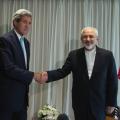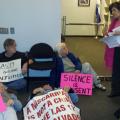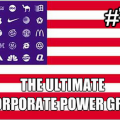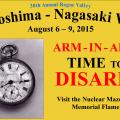by Odile Hugonot Haber, Program Committee chair
In his first foreign policy speech April 5, 2009, President Obama in Prague told thousands of people that his presidency would see “America's commitment to seek peace and security of a world without nuclear weapons.”
So when on July 15 Obama announced that a deal had been made with Iran on its nuclear capability, it made sense and the deal was declared to the world. The preface of this 159-page document called the “Iran deal” starts: “The E3/EU+3 (China, France, Germany, the Russian Federation, the United Kingdom and the United States, with the High Representative of the European Union for Foreign Affairs and Security Policy) and the Islamic Republic of Iran welcome this historic Joint Comprehensive Plan of Action (JCPOA), which will ensure that Iran’s nuclear program will be exclusively peaceful, and mark a fundamental shift in their approach to this issue.”
It explains how Iran renounces having a nuclear weapons program and then will expect all sanctions to be lifted in a period of six months following the new UN resolution that will be passed to this effect. “The JCPOE will produce the comprehensive lifting of all UN Security Council sanctions as well as multilateral and national sanctions related to Iran's nuclear program including steps on access in areas of trade, technology, finance, and energy.”
Since 2003 Iran devised a number of proposals which initially included provisions to limit operations of its nuclear facilities and implement transparency measures for its nuclear activities. Year after year they were rejected, and Iran also was not prepared to curb its nuclear activities and refused to suspend its enrichment related program. So every year new packages were in discussion; surprisingly, this year it worked.
So what worked? What are the conditions of this treaty?
- It would increase the time it would take for Iran to acquire enough material for one bomb from 2 to 3 months to one year.
- Reduce Iran's stock piles of enriched uranium.
- Reduce the number of Iran's installed centrifuges by two-thirds.
- Prevent Iran from producing weapons grade plutonium.
- Track Iran's nuclear activities with robust transparency and inspections
It consists of an unprecedented verification regime. What is “unprecedented” is the continuous surveillance with high tech monitoring system. If any suspect activity is noticed, then there is a 24-day time line by which the verification can take place. “Anywhere, anytime.”
The International Atomic Energy Agency (IAEA) will have continuous surveillance at enrichment sites, centrifuge production, and storages sites. The IAEA has the right to visit suspicious sites anywhere in the country, and Iran has 24 days to comply with the request. There is as well an embargo on conventional weapons. With the backing of Russia and China who are main weapons suppliers, Iran won that the embargo will be temporary and be lifted after eight years for ballistic missiles and after five years for conventional weapons. Time frame could be shorter if the IAEA certifies that Iran 's nuclear program is for peaceful purposes only.
“We cut off every path for Iran to develop a nuclear weapon,” affirms John Kerry, the Secretary of State; “the Nuclear Non-Proliferation Treaty entitles them to have a peaceful nuclear program.”
Iran's uranium enrichment program is curtailed for 15 years, and there is a cap on research and development for 10 years. Once it complies with all rules and regulations, what will Iran gain? The sanctions will be lifted sequentially as Iran complies with the requirements in the accord.
The deal contains five schedules pertaining to each component. They will be allowed to rebuild their economy. What will they do with this new economy remains a question for many: will they continue to sponsor terrorism? or then attempt to build the bomb?
It seems that one of the natural results of this agreement is that Iran might become more of a partner of the United States at least in fighting together terrorism like from the Islamic State. Obama says: “The Iran deal will make the world safer.” We sure hope so.
Netanyahu has bitterly complained that this was a “historic mistake,” and has convinced the U.S. administration to shore up some economic compensation to bolster Israeli defense in additional aid money to the 4.5 billion a year that Israel will get for the next 10 years.
Will this deal bring us closer to the goal of creating a Middle East Weapons of Mass Destruction Free Zone? Time will tell. It certainly seems like a excellent opportunity to move to the next level and then accomplish this goal that would bring finally relief and peace to the region. This is the hope of a Middle East nuclear free zone, or a Weapons of Mass Destruction Free Zone as called for by many of the UN resolution.
This Monday the UN Security Council is due to vote on this deal, a move that many of the Republicans would like to delay. John Kerry affirms that the deal will not take effect until 90 days after the Security Council endorses the accord giving Congress time for action. “It is presumptuous to think that France, Russia, China, Germany, Britain, ought to do what Congress tell them to do, he said on ABC's “This Week.”
The Iran deal is a success for the Obama Administration in terms of showing what diplomacy can accomplish and preventing war. But the Republicans have sworn that they will fight this effort and President Obama is on a campaign nationally to get support for it. Senator Bob Corker, chair of the Senate Foreign Relations Committee (Tennessee,) and Senator Ben Cardin, the committee's ranking Democrat (Maryland) are heading these efforts.
The Senate and House will have 60 days to scrutinize the deal and hold hearings, and this deal will become law if accepted. Or it is rejected, the opponents of this deal will write a joint resolution of disapproval that can then be vetoed by the President. Afterwards it will take two-thirds of each house to overturn the Presidential veto.
It is now a crucial moment to put grassroots pressure for it. We hope that the Women 's International League for Peace and Freedom will support the bill nationally and that members will call their representatives and affirm their support for it.
Sources:
- New York Times: Clearing Hurdles to Iran Nuclear Deal with Standoff Shout and Compromises by David Sanger and Michael Gordon. (July 15, 2015)
- NYT: U.N. Vote of Iran Nuclear Deals Irks Congress by Michael Gordon and David Sanger (July 19, 2015)
- Voice of America: Experts: Nuclear Deal May Spark US-Iran Cooperation Against ISIS
- (July 2015)
- The Guardian: Obama Says Iran Deals “will make the world safer” as Republicans plot opposition by Jana Kasperkevic (July 18 2015)
- State Department web site
-
Senator Bob Corker web site
Photo: Secretary of State John Kerry meets with Iranian Foreign Minister Javad Zarif in Geneva on January 14 for a bilateral meeting to provide guidance to their negotiating teams before their next round of discussions, which begin on January 15. Credit: U.S. Mission/Eric Bridiers Creative Commons License













